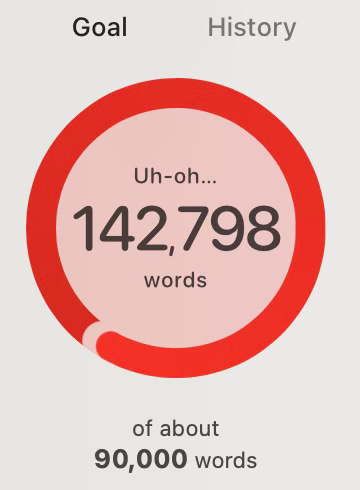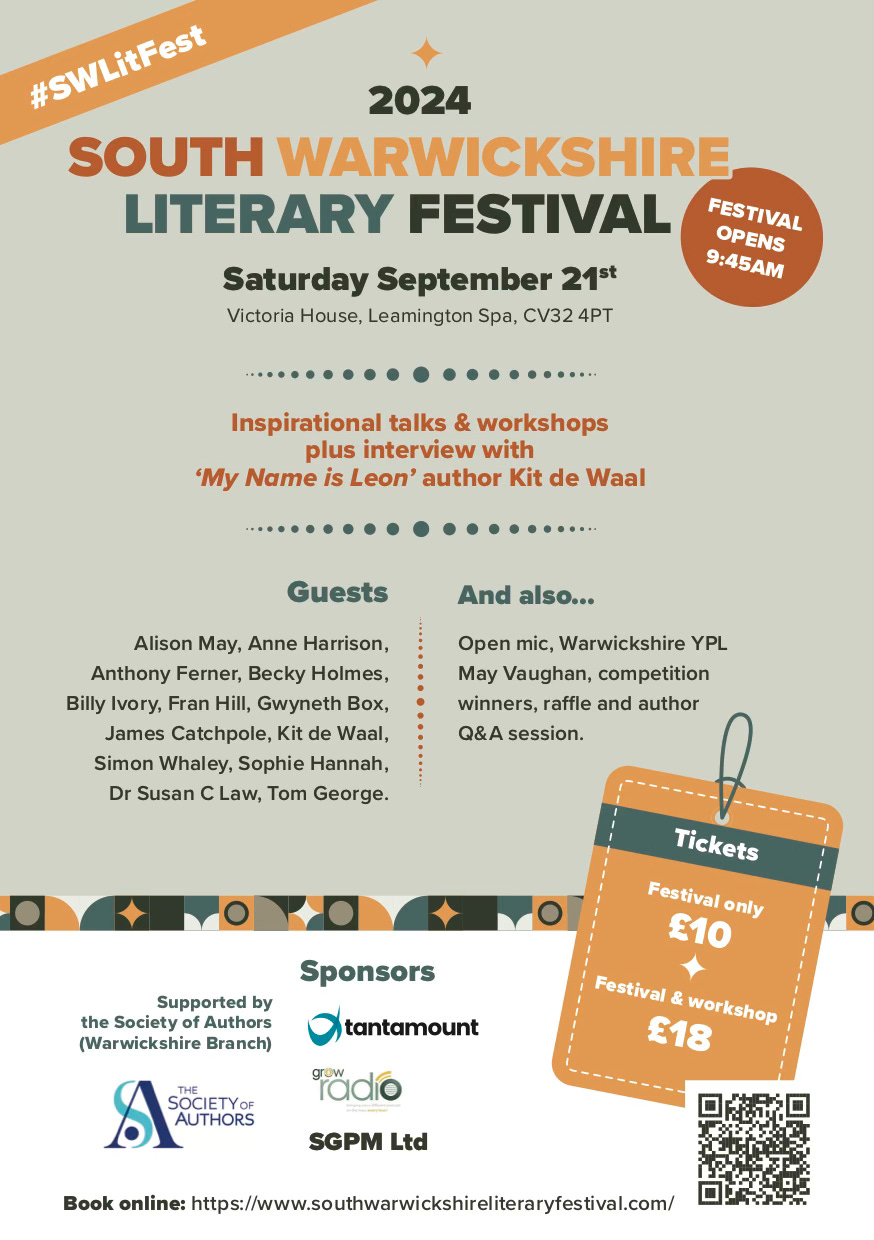Welcome to my March 2024 newsletter.
I hope spring is putting a spring into your writing mojo. We’ve had a few nicer days here in the Welsh Borders, but winter is refusing to make a complete exit at the moment.
Surprise Birthday
“I like the idea, Simon, but I want to think about it a bit more. I’ll be in touch in a week or so.”
I’d pitched an idea for a 900-word article to the editor of Writing Magazine and at least it wasn’t a straight No! Usually, I chase an editor after two weeks, but this time I left it three.
Hi, I was just wondering if you’d had chance to think about my pitch idea? I tentatively asked in my follow up.
Silence.
Oh, the joys of being freelance! I put it to one side again, and carried on with other projects. A couple of weeks later, I bit the bullet and sent another nudging email.
Hi, Have you had an opportunity to think about my original pitch idea. If you’d like me to make any changes, or alter the angle, I’d be happy to do so.
Within a couple of hours, I received a response.
“Hi Simon, Sorry to keep you waiting. Yes, I like this idea. You pitched 900 words, but could you expand it to 1700?”
Of course I could, I thought. That’s a two-page piece and that’s more money. Then I read the next line.
We’re not covering much about the business side of writing in the magazine. Can you give me five more ideas looking at the business aspects of being a writer?
Gulp! Five! Immediately, I put on my thinking cap and rustled together five different ideas, and sent them to him.
“Great!” he replied, minutes later. “I’ll take them all.”
And that is how The Business of Writing column began in Writing Magazine ten years ago this month. (Technically, the first piece appeared in the April 2014 issue of Writing Magazine, but the issue appears in the shops the previous month, and the April 2024 issue is out now!)
I can’t believe I’ve been writing it for ten years. That’s twelve 1,700-word articles every year for ten years. (That’s 204,000 words, in case you we wondering.)
Looking back, there’s so much I now understand from this experience.
1. You never know where an idea may lead
I didn’t pitch the editor for a column. I pitched a single article idea. In fact, I pitched a 900-word idea, not a 1700-word one. As writers, we never know what our idea might spark off in the editor’s head when they read it.
2. Relationships are everything
From a tax perspective, we’re seen as sole traders—a business comprising one individual. But for our writing business to thrive, we need to build relationships. When I sent this pitch into the editor, he’d already accepted half a dozen pitches from me over the previous two years. Therefore, he already knew me (albeit electronically via emails. I did subsequently meet him at a writing festival.)
3. Rejection still counts as something
Although he’d published several of my pieces previously, he’d also rejected several of my previous pitches too. But that still resonated with him. My regular pitching demonstrated I was coming up with ideas. Regularly. This is what editors are looking for from a regular contributor. So those rejected pitches showed him I was persistent.
4. Ideas are everywhere
Considering I’ve now written over 120 articles for this column (actually, it’s more than that because I’ve just delivered the July 2024 issue’s piece), as I look back I see that rarely have I revisited a topic. And when I have, it is only because things have changed and readers needed to be aware of those changes (oh the joy of tax and the Government’s aim to Make Tax Digital!). All the other articles have been on completely different topics. When the editor first asked me for that batch of five additional ideas, I panicked! It felt hard enough coming up with that original one, let alone five more. Would I be able to think of any more? Well, ten years on, the answer is definitely Yes!
Even now, when I sit down to come up with my next batch of ideas, I always wonder, What’s left to say on this subject? and yet more ideas come to me. (Don’t get me wrong, it sometimes takes a while, but I always come up with something new.)
5. A regular column helps with the motivation of other projects
Knowing that I have to produce something every month keeps me motivated, as does seeing my name in print every month. I have good months and bad months—times when the ideas and writing flow better than others. Some months, my Business of Writing piece might be the only article I write (often because I’m working on bigger projects), but that regularity keeps me motivated on the bigger projects too. I’ve always liked the relative speed of publication when writing articles. Books are bigger projects and can take years. Write an article and you get that publication dopamine hit a bit quicker.
Even if you’re writing books, especially non-fiction books, think about whether you can use your knowledge from your book to write an article on the subject matter. When the book is published, the article then becomes great publicity for your book.
Ultimately, the column spawned this newsletter, which began as a blog before morphing into this format. And, because of the rights I retain in those articles, I release those articles as collections in book format. (Volume five will be out later this year, by the way.)
So that one 900-word article pitch, just over ten years ago, became a column, a blog (then a newsletter) and also four self-published books (so far). And, ultimately, it became a second bi-monthly column when the editor asked me to write the Ask The Agent column (which, unbelievably, is now celebrating its first year birthday, too).
Business is all about making the most of opportunities. As writers, whenever we have an idea, whether it be for an article, non-fiction book, novel, stage-play, or even a short magazine filler, we’re creating potential opportunities for so much more. Yes, there’s the opportunity that’s at the forefront of our mind (publication of said article, non-fiction book, novel, etc), but there could be many more opportunities that arise out of that idea. (Regular subscribers will know that my first book, One Hundred Ways For A Dog To Train Its Human, arose from an idea that began life as a 75-word magazine-filler, before growing into an article, and then ultimately a book. And yes, twenty-one years later, the book is still generating royalties.)
If you want your writing business to thrive, be pro-active. Come up with ideas, and do something with them. Because you never know where one idea may take you.
Third Novel Update
I’m currently working on my third novel, and it’s not being going as well as I’d have liked/ Authors often moan about how hard second novels are. Well, all I have to say is just wait until you get onto the third!
I’m a discovery writer, which means I sit down with my characters and then discover the journey they take me on. I’m not a detailed planner, because I’ve always found that if I do that the characters rip up the plan and take me off in another direction. Actually, part of the joy for me is discovering what the story is. I tried planning a detailed outline once, and that killed the story for me. Once I knew what was going to happen, I lost interest in writing the novel.
So, when I sit down to write, I know what the problem is that starts the journey for my characters, and I know what the end is—I know what the resolution will be. But how my characters get there … well, that’s down to them!
Which probably explains why the first draft of my third novel stands at 142,798 words. Which is a lot. In fact, it’s far too many. My novels need to be about 90,000 words, so as you can see, I’ve got about a third to cut.
At the moment, this doesn’t worry me too much. Now I’m at the end of the first draft I now have a clearer idea of what I need to strengthen in the text and what can be cut. (It’s the next draft that’ll be really challenging!)
When I mention this to some writers they gasp when they realise I need to discard a third of my text. Surely, that’s the point of planning? Well, yes, but as I’ve explained, if I plan that kills the motivation for me. I don’t see those 50,000 words as a waste of time. I needed to write them in order to get the first draft done. Without them, I wouldn’t have a first draft. And without a first draft, I have nothing to knock into shape. As is often said, the real writing is in the rewriting.
Remember, there’s no right or wrong way to write a book (or anything, for that matter). There’s just your way. Part of the fun of the business of writing is trying to work out what you way is!
South Warwickshire Literary Festival
Just a reminder that on September 21st 2024, I shall be running a travel-writing workshop at the South Warwickshire Literary Festival (in Leamington Spa). Spaces are limited to ten (tickets £18, but give access to other festival events too). In the afternoon, I shall also be appearing on an Author Q&A panel alongside Sophie Hannah, Alison May, Billy Ivory, and James Catchpole. For more details, visit:
https://www.southwarwickshireliteraryfestival.com/
Until next month, keeeeeeeeeep writing!
Best wishes,
Simon








I salute your staying power, Simon. I cut my article-writing teeth on Writers' Forum waaay back in the day. It was coming up with the angles that flummoxed me.
I also miss Writer's Forum. I like how you've outlined your journey here and I admire how you said yes to everything but for me, personally, I wouldn't be able to cope with the pressure of producing a commission every month. It would petrify me and it's this crippling anxiety that would stop the creative flow - which is why I stick to short stories. I can choose to write or not write, to sub or not sub. No fiction ed has commissioned me (Although a certain mag does sometimes commission certain writers) I don't think they are likely to choose me, anyway!